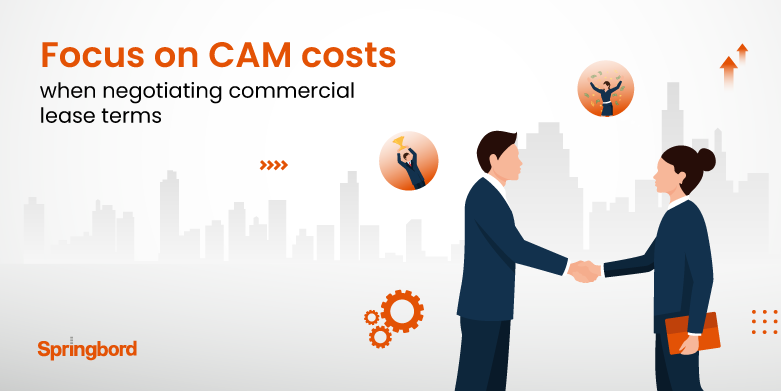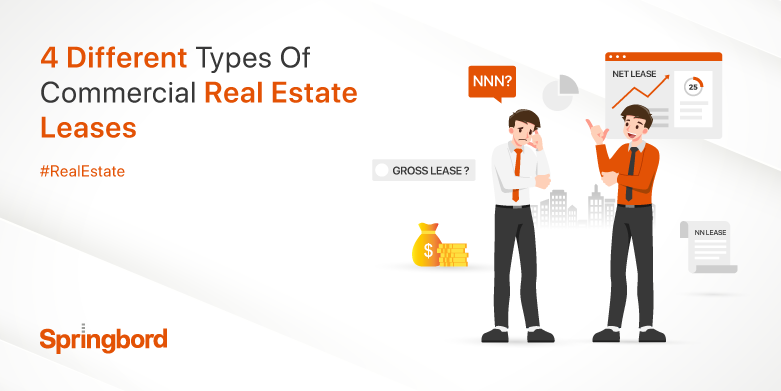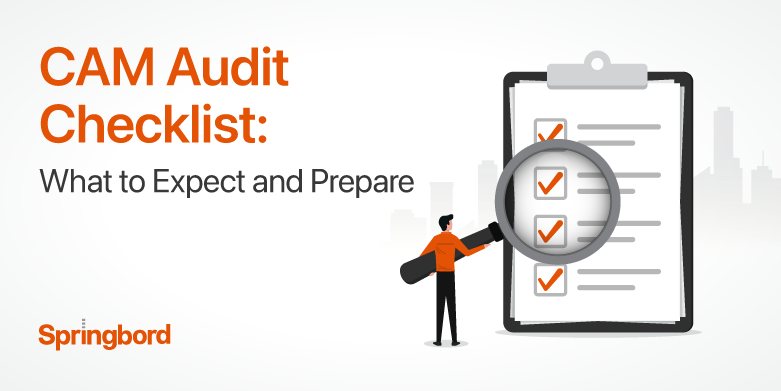Conducting CAM audits is an essential part of managing commercial real estate. For landlords, these audits ensure that CAM charges are accurately calculated, allocated fairly among tenants, and compliant with lease agreements and regulatory requirements.
Let’s explore the significance of CAM audits in this blog, which emphasizes the importance of these assessments from the landlord’s point of view.
Purpose and Importance of CAM Audits
Common Area Maintenance charges encompass the costs associated with maintaining shared spaces in commercial properties. These charges typically cover expenses such as landscaping, security, utilities, cleaning, and repairs. The objective is to ensure that these costs are equitably distributed among tenants based on their lease agreements.
Significance of CAM Audits for Landlords
For landlords, conducting regular CAM audits is crucial for several reasons:
- Accuracy and Transparency: CAM audits verify that all maintenance costs are properly documented and allocated according to lease agreements. This transparency helps maintain trust between landlords and tenants.
- Financial Integrity: Regular audits help landlords avoid overcharging or undercharging tenants, ensuring that all expenses are accounted for correctly. This accuracy is essential for financial planning and maintaining the property’s profitability.
- Compliance and Risk Mitigation: CAM audits ensure compliance with legal and regulatory requirements. They help landlords stay updated with current real estate tax laws and avoid potential legal disputes related to CAM charges.
- Property Value Maintenance: Accurate CAM charges contribute to maintaining the value of the property. Mismanagement of CAM fees can reduce property value, making it less attractive to potential investors.
Legal and Financial Implications
CAM audits have significant legal and financial implications. Legally, landlords must comply with the terms outlined in lease agreements and local regulations governing CAM charges. Financially, accurate CAM audits prevent revenue loss from uncollected charges and protect against tenant disputes.
A study by Jones Lang LaSalle found that discrepancies in CAM charges can lead to tenants overpaying by up to 3% annually. Regular audits can help mitigate such discrepancies and ensure that landlords meet their financial obligations.
Our area of expertise at Springbord is offering thorough CAM audit services. Our team ensures that all CAM charges are accurately calculated and compliant with lease terms. Landlords can protect their investments, uphold transparency, and improve tenant relations by utilizing our experience.
Understanding CAM Charges
CAM charges refer to the expenses incurred by the landlord for the maintenance and operation of common areas on a commercial property. These areas typically include lobbies, corridors, parking lots, landscaping, and shared restrooms. The main components of CAM charges are:
- Landscaping: Costs related to maintaining green spaces, gardens, and other outdoor areas.
- Security: Expenses for on-site security personnel, surveillance systems, and related infrastructure.
- Maintenance: General upkeep of the building, including cleaning services, repairs, and maintenance of HVAC systems.
- Utilities: Shared utility costs such as water, electricity, and heating for common areas.
Effective management of these charges requires a meticulous approach to ensure fairness and accuracy.
Lease Agreement Clauses
Lease agreements must clearly define the scope and methodology for calculating CAM charges. Key clauses related to CAM charges include:
- Expense Inclusion: A detailed list of what expenses are included in CAM charges, ensures transparency and prevents disputes.
- Calculation Methodology: The formula or method used to allocate CAM charges among tenants, typically based on the rentable square footage.
- Cap on Increases: A limit on how much CAM charges can increase year-over-year to protect tenants from significant cost fluctuations.
- Audit Rights: Tenants’ rights to audit CAM charges, ensuring they are only paying their fair share of the costs.
Failing to accurately draft these clauses can lead to misunderstandings and disputes.
Common Pitfalls and Tenant Concerns
One of the most common pitfalls in managing CAM charges is the misallocation of expenses. Tenants often find discrepancies between the CAM charges invoiced and the actual services provided. According to Springbord, common tenant concerns include:
- Hidden Charges: Unexpected expenses are included in CAM charges without prior notice or justification.
- Inaccurate Allocations: Incorrect pro-rata allocations that unfairly distribute costs among tenants.
- Lack of Transparency: Insufficient breakdown and explanation of the components of CAM charges.
To mitigate these issues, landlords should conduct regular audits and maintain open communication with tenants regarding any changes in CAM charges.
To help landlords ensure compliance with lease agreements, spot discrepancies, and confirm the accuracy of CAM charges, Springbord provides specialized CAM audit services. Landlords can improve the efficiency of property management by fostering positive tenant relationships and upholding transparency by utilizing Springbord’s expertise.
Preparing for a CAM Audit
To make sure that the costs imposed on tenants on commercial properties are accurate and equitable, CAM audits are essential. Proper preparation for a CAM audit can significantly enhance the audit’s effectiveness, prevent disputes, and ensure compliance with lease agreements.
Pre-Audit Documentation
Effective CAM audit preparation begins with meticulous documentation. The following documents are essential for a thorough audit:
- Invoices: Detailed invoices for all CAM expenses, such as landscaping, security, maintenance, and utilities. These invoices should be itemized to provide a clear breakdown of costs.
- Contracts: Agreements with service providers that outline the scope of services and associated costs. These contracts help verify that expenses are in line with what was agreed upon.
- Maintenance Logs: Records of all maintenance activities, including dates, descriptions of work performed, and associated costs. Maintenance logs ensure that all charges are justified and correspond to actual work done.
Organizing Financial Records
Organizing financial records is a critical step in preparing for a CAM audit. Proper organization ensures that all necessary documents are easily accessible, facilitating a smoother audit process. Key practices include:
- Digital Archiving: Utilize digital archiving systems to store and organize documents electronically. This allows for quick retrieval and reduces the risk of lost or misplaced documents.
- Categorization: Categorize documents by type (e.g., invoices, contracts, logs) and by time (e.g., monthly, quarterly, annually). This makes it easier to track and verify expenses over time.
- Cross-Referencing: Implement a cross-referencing system to link related documents (e.g., linking invoices to corresponding contracts and maintenance logs). This enhances traceability and verification during the audit.
Internal Review
Before the formal audit, conducting a preliminary internal review can help identify and address potential issues. This proactive approach can save time and resources during the actual audit. Key steps include:
Conducting a Preliminary Internal Review
- Expense Verification: Review all CAM-related expenses to ensure they are legitimate and correctly allocated. Cross-check invoices and contracts to verify the accuracy of charges.
- Compliance Check: Ensure that all CAM charges comply with lease agreements and relevant regulations. This includes checking for any caps on increases or excluded expenses.
- Reconciliation: Reconcile CAM expenses with the budgeted amounts and the previous year’s charges. Significant variances should be investigated and explained.
Conducting the CAM Audit
Conducting a CAM audit is an essential process for ensuring the accuracy and fairness of CAM charges. This process helps landlords verify that all expenses are legitimate, correctly allocated, and compliant with lease agreements.
Selection of Auditor
Choosing the right auditor for a CAM audit is crucial for ensuring accuracy and compliance. The auditor must have the necessary expertise, experience, and integrity to conduct a thorough review of CAM charges.
Criteria for Choosing a Qualified Auditor
Choosing the right auditor is crucial for a successful CAM audit. Here are key criteria to consider:
- Experience in Commercial Real Estate: The auditor should have extensive experience in commercial real estate and CAM charges. Familiarity with industry standards and common issues is essential for accurate auditing.
- Professional Certifications: Look for auditors with relevant certifications, such as Certified Public Accountant (CPA) or Certified Property Manager (CPM). These credentials indicate a high level of expertise and professionalism.
- Reputation and References: Check the auditor’s reputation in the industry and request references from previous clients. Positive feedback and a solid track record are good indicators of reliability and competence.
- Technical Skills: The auditor should be proficient with auditing software and tools, which can streamline the process and improve accuracy.
Audit Process Overview
The CAM audit process involves a detailed review of expenses, allocation methods, and lease compliance to ensure transparency and accuracy. The step-by-step breakdown provides the audit process, focusing on key areas such as expense verification and identifying discrepancies.
Step-by-Step Breakdown of the Audit Process
Conducting a CAM audit involves several critical steps:
- Pre-Audit Planning:
- Define the scope of the audit and establish clear objectives.
- Gather and organize all relevant documentation, including invoices, contracts, and maintenance logs.
- Expense Verification:
- Review all CAM-related expenses to ensure they are legitimate and accurately documented.
- Cross-check expenses against contracts and invoices to verify that they are within the agreed terms.
- Allocation Methods:
- Assess the methodology used to allocate CAM charges among tenants.
- Ensure that the allocation method is consistent with lease agreements and industry standards.
- Lease Compliance:
- Verify that all CAM charges comply with the specific terms of the lease agreements.
- Check for any caps on increases, excluded expenses, or other relevant lease provisions.
- Discrepancy Identification:
- Identify and document any discrepancies or errors in the CAM charges.
- Provide recommendations for corrections and improvements.
- Reporting:
- Prepare a detailed audit report summarizing findings, discrepancies, and recommendations.
- Communicate the results to relevant stakeholders, including property managers and tenants.
Springbord’s expertise in CAM audits provides landlords with comprehensive and reliable auditing services, ensuring accurate expense allocation and compliance with lease agreements.
Conclusion
Conducting CAM audits is a vital process for landlords to ensure the accuracy and fairness of CAM charges. These audits help in maintaining transparency, financial integrity, compliance with legal requirements, and the overall value of the property. By meticulously preparing for the audit, selecting a qualified auditor, and following a structured audit process, landlords can effectively manage CAM charges and foster positive tenant relationships.
Springbord specializes in providing comprehensive CAM audit services tailored to the unique needs of commercial real estate. With a team of experienced professionals, Springbord ensures that all CAM charges are accurately calculated and compliant with lease terms.







